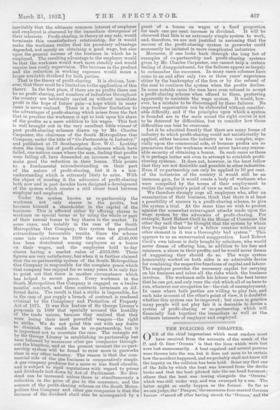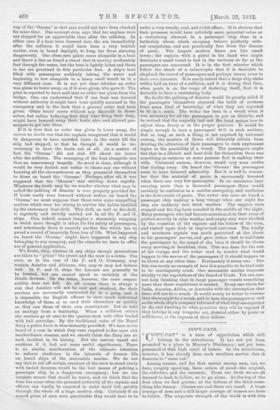THE POLICING OF DISASTER.
ONE of the chief impressions which most readers must have received from the accounts of the wreck of the P. and 0. liner Oceana ' is that the lives which were lost were lost unnecessarily. A boat capsized and several persons were thrown into the sea, but it does not seem to be certain how the accident happened, and we probably shall not know till the inquiry on the collision has been held. Some say that one of the falls by which the boat was lowered from the davits broke and that the boat pitched into the sea head foremost ; others that the boat was towing alongside the Oceana,' which was still under way, and was swamped by a sea. The latter might as easily happen as the former. So far as we can judge, the • Pisagua,' the enormous four-masted German barauA qlenced off after having struck the `Oceans; and the
way of the "Oceana' in that case would not have been checked for some time. One account even says that her engines were not stopped for an appreciable time after the collision. In either case if a boat were lowered into the sea immediately after the collision it would have been a very ticklish matter, even in broad daylight, to keep her from sheering dangerously. One often sees pilots come alongside in a boat and throw a line on board a vessel that is moving moderately fast through the water, but the boat is lightly laden and those in her are practised in this particular feat. A. ship's boat filled with passengers suddenly taking the water and beginning to tow alongside in a heavy swell would he in a very different case. It is not yet clear whether an order was given to lower away, or, if it were given, who gave it. The pilot is reported to have said that no order was given from the bridge. One can understand that if one boat was lowered without authority it might have been quickly assumed in the emergency and in the dark that a general order had been given. Other boats' crews without any discredit to them- selves, but rather believing that they were doing their duty, might have lowered away their boats also, and allowed pas- sengers to get into them.
If it is true that no order was given to lower away, the reason no doubt was that the captain recognized that it would
be dangerous to have crowded boats in the water till the ship had stopped, or that he thought it would be -un- necessary to have the boats out at all. As a matter of fact the Oceana' did not sink till about six hems after the collision. The swamping of the boat alongside was thus an unnecessary tragedy. So much is clear, although it would be 'very foolish and unfair to blame any one without knowing all the circumstances as they presented themselves to those on board the ' Oceans.' Perhaps, after all, it was supposed that the ' Oceans' was settling down rapidly. Whatever the truth may be, we wonder whether what may be called the policing of disaster is ever properly provided for, If boats really were lowered without orders on board the ' Oceana' we must suppose that there were some compelling motives which were too strong to survive the habits instilled by the customary boat-drill. This drill, as well as fire-drill, is regularly and strictly carried out in all the P. and 0. ships. One, indeed, cannot imagine a steamship company in which more thought is taken for the safety of passengers, and notoriously there is scarcely another line which has so proud a record of immunity from loss of life. What happened on board the 'Oceana' might have happened in any ship belonging to any company, and the remarks we have to offer are of general application.
We doubt, then, whether in any ships enough precautions are taken to " Police" the crowd and the crew in a crisis. The crew, as in the case of the P. and 0. Company, may contain Asiatics and Africans, who may or may not behave well. In P. and 0. ships the Lascars are generally to be trusted, but one cannot speak so certainly of the Hindu firemen. On the latter, however, the same respon- sibility does not fall. At all events there is always a risk that Asiatics will not be cool and obedient, for their services are necessarily contracted for in a gang, and it is impossible for English officers to have much individual knowledge of them or to read their characters as quickly as they can those of their own countrymen. Let us take an analogy from a battleship. When a collision occurs the marines go at once to the quarter-deck with rifles loaded with ball cartridge. By the traditional rules of the Royal Navy a police force is thus instantly provided. We have never heard of a case in which they were required to fire upon any insubordinate seaman, and we should think the Navy has no such incident in its history.. But the custom would not continue if it had not some useful significance. There is no similar manifestation of the ultimate intention to enforce obedience in the interests of human life on board ships of the mercantile marine. We do not say that to tell off certain members of the crew to stand ready with loaded firearms would be the best means of policing a passenger ship in a dangerous emergency; but we can imagine means that would be worse, and we think that the time has come when the personal authority of the captain and officers can hardly be expected to make itself felt quickly through the whole of a huge modern ship. Certainly if an armed posse of men were practicable they would have to be under a very steady, cool, and strict officer. It is obvious that their presence would have infinitely more potential value as a restraining element in a passenger ship than in a battleship whose whole company behave perfectly with- out compulsion, and are practically free from the disease of panic. The largest modern liners are like small towns ; the captain with a pistol in his band who might dominate a small vessel is lost in the vastness so far as the passengers are concerned. It is in the first minutes which follow the shock of a catastrophe that it is desirable to shepherd the crowd of passengers and perhaps coerce some in their own interests. It is rarely indeed that a large ship sinks within half an hour of a collision, and it is during that time, when panic is on the verge of declaring itself, that it is desirable to have a restraining body.
No doubt the policing of disaster would be greatly aided if the passengers themselves abquired the habit of coolness from seine kind of knowledge of what they are expected to do in a crisis. The writer has been in a wreck when it was necessary for all the passengers to put on lifebells, and he noticed that the majority had not the least notion how to adjust them firmly or in the proper position. It would be simple enough to have a passengers' drill in such matters. But so long as such a thing is not required by universal custom, the masters of liners will delicately refrain from drawing the attention of their passengers to snob unpleasant topics as the possibility of a wreck. The passengers might feel that in a lifebelt and boat-drill for themselves there was something as ominous as some persons find in making their wills. Universal custom, however, would very soon soothe that feeling away. On board the *Oceana ' the passengers seem to have behaved admirably. But it is well to remem- ber that the material of panic is enormously lessened when there are very few passengers. In an enormous liner carrying more than a thousand passengers there would certainly be confusion in a sudden emergency, and confusion is the first-cousin of panic. The writer was once on board a passenger ship making a long voyage when one night the ship ran suddenly into thick weather. The engines were stopped and the fog-horn sounded in the middle of the night. Many passengers who had become accustomed to their sense of perfect security in calm weather and empty seas were startled. by the cessation of the engines and the bellow of the horn, and rushed upon deck in improvised costumes. The kindly and courteous captain was much perturbed at the shock to his passengers' nerves, and gave orders that to habituate the passengers to the sound of the horn it should be blown every morning at breakfast time. This was done for the rest of the voyage, and the writer used to wonder what would happen to the nerves of the passengers if it should happen to be blown at any other time. Fortunately it never was. But this was surely an example of how it is possible to be kind only to be contingently cruel. Our mercantile marine responds strictly to the regulations of the Board of Trade. Yet one can- not help thinking that in large passenger vessels something more than those regulations is needed. Every one starts for India, America, Africa, or Australia with the assumption that there will not be a wreck. It would surely be better to assume that there might be a wreck, and to have the passengers as welt as the whole ship's company informed of what they are expected to do, and knowing to what penalties they will be exposed if they indulge in any irregular act, dictated either by panic or selfishness, at the expense of their fellows.







































 Previous page
Previous page